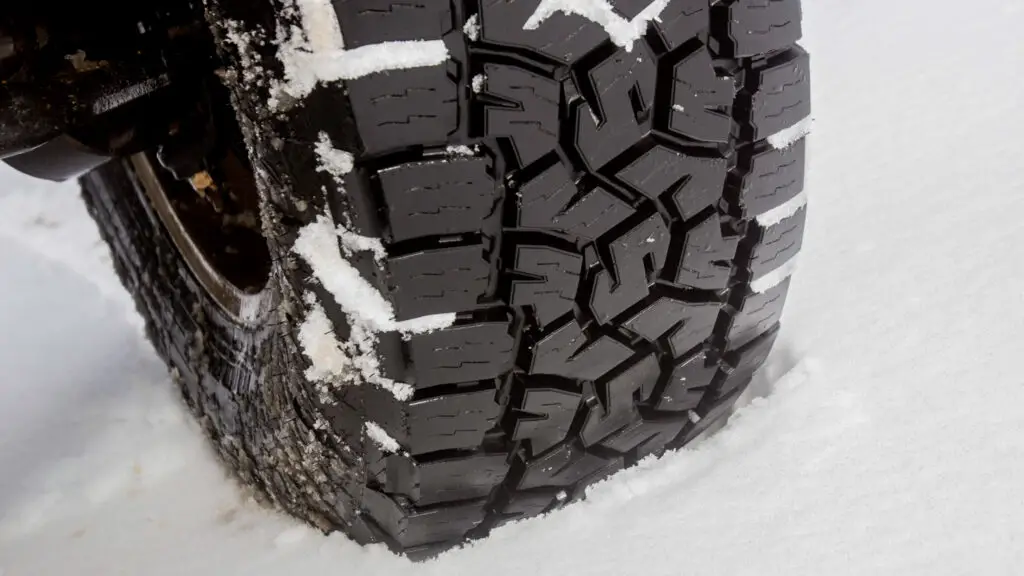Are off-road tires good for snow? Off-road tires perform poorly in snow, especially in harsh conditions. They are better suited for rough terrains like mud and gravel.
When winter weather hits, choosing the right tires is important to ensure safety and maintain performance on snow-covered roads. While off-road tires, such as all-terrain and mud-terrain tires, are designed for rugged conditions, they may not always provide the best performance in snowy and icy environments.
In this article we will explain whether off-road tires are suitable for snow and what factors you should consider before hitting the road in winter conditions.

Contents
What Are Off-Road Tires?
Off-road tires are designed specifically for handling rough terrains such as mud, dirt, gravel, and rocks. They feature aggressive tread patterns with deep voids and larger lugs, providing excellent traction on loose surfaces. Off-road tires are generally split into two categories:
- All-Terrain Tires (A/T): These offer a balance between on-road comfort and off-road capability, making them versatile for various conditions.
- Mud-Terrain Tires (M/T): These are specialized for extreme off-road conditions, excelling in muddy, sandy, and rocky environments but may sacrifice comfort and road noise on pavement.
Are Off-Road Tires Good for Snow?
Off-road tires, while excellent for rugged terrains, aren’t ideal for snow conditions. Let’s break down how off-road tires perform in snow, looking at key factors like tread design, rubber compound, and siping.
1. Tread Design: How it Affects Snow Traction
Tread design plays a vital role in a tire’s ability to perform in snowy conditions. Off-road tires are built with deep, aggressive tread patterns meant for loose surfaces such as sand and mud. However, these treads can trap snow between the tire lugs, which reduces traction and performance in snow.
Snow tires, on the other hand, feature a refined tread design with smaller grooves, allowing for better snow evacuation and maximizing the contact area with the road. These tires are specifically designed to provide the best traction on snow and ice.
So, while off-road tires might manage in light snow, snow tires outperform them in challenging winter conditions, especially when the snow is deep or packed.
2. Rubber Compound: Flexibility in Cold Weather
Off-road tires, especially mud-terrain variants, are made from a harder rubber compound to withstand rough off-road environments. However, this rubber becomes stiffer in cold temperatures, reducing traction on icy or snowy surfaces. The rigid compound does not allow the tire to maintain sufficient flexibility in cold conditions, resulting in poor performance on snow.
On the other hand, snow tires are made with a soft rubber compound that remains flexible even in freezing temperatures. This flexibility allows snow tires to maintain better contact with snow-covered roads, offering superior grip and safety in winter conditions. For snowy climates, snow tires provide the best performance because they are designed with cold weather in mind.
3. Siping: The Key to Better Traction
Siping refers to the small cuts or slits in the tire’s tread that create additional biting edges. These edges help the tire grip the road, especially in icy and slippery conditions. Off-road tires often lack sufficient siping, which limits their ability to perform well in snow.
Winter tires, however, are designed with extensive siping to improve traction on slippery surfaces. This means that snow tires can handle snow and ice more effectively than off-road tires. The increased number of biting edges helps snow tires grip icy roads, providing better stability and control when driving in winter conditions.
4. 4WD Capability: Off-Road Tires and Snow
The performance of off-road tires can improve if your vehicle is equipped with a four-wheel-drive (4WD) system. 4WD systems distribute power to all four wheels, allowing the vehicle to move through light snow more effectively. In such conditions, off-road tires can be more efficient than they would be on a two-wheel-drive vehicle.
However, 4WD does not make off-road tires suitable for harsh winter conditions. While 4WD helps in snow by providing better traction, it does not enhance the tire’s ability to stop or corner on icy roads. For safer winter driving, snow tires are still recommended, as they are specifically designed to perform in icy and snowy conditions.
5. Off-Road Tires in Light Snow vs. Heavy Snow
In light snow, off-road tires may manage well enough to get you through, especially if the roads are regularly plowed and the snow isn’t too deep. The larger tread lugs on off-road tires can provide adequate traction for snow-covered roads that aren’t too slippery.
However, when snow accumulates in greater depths or turns to slush or ice, off-road tires will struggle to maintain traction. Snow tires are better equipped to handle these challenging conditions because they are specifically built to perform in extreme winter weather.

Should You Use Off-Road Tires for Snow?
While off-road tires can handle light snow and may work well in areas with minimal winter conditions, they are not ideal for harsh winter driving. Off-road tires are designed to perform best in loose surfaces like sand, mud, and gravel, and they do not offer the same level of performance as snow tires when it comes to ice and snow.
If you live in an area with heavy snow or frequently experience icy roads, snow tires are a safer choice. Snow tires are designed with softer rubber compounds and specialized tread patterns that offer superior traction on snow and ice.
However, if snow is a rare occurrence in your area, and you only experience light snow during the winter months, you might be able to get by with off-road tires, especially if your vehicle is equipped with 4WD.
For those who occasionally drive in snowy conditions but still need off-road capabilities, consider choosing all-terrain tires with the Three-Peak Mountain Snowflake (3PMSF) rating. These tires provide a balance between off-road performance and the ability to handle light snow.
Alternatives to Off-Road Tires for Snow
While off-road tires may suffice in light snow, they are not the best choice for heavy winter conditions. If you live in an area with frequent or severe snow, there are better alternatives that can offer improved traction, safety, and performance in snow and ice.
1. All-Terrain Tires with Snow Capabilities
Some all-terrain tires are designed with snow performance in mind, making them a good compromise between off-roading and winter driving. Look for all-terrain tires that feature the Three-Peak Mountain Snowflake (3PMSF) symbol, which means they meet snow traction standards. These tires, such as the Falken Wildpeak A/T3W and Goodyear Wrangler Duratrac, offer improved winter performance while still providing off-road capability.
2. Snow Tires (Dedicated Winter Tires)
If winter driving is common where you live, dedicated snow tires are the best option for optimal performance. Snow tires are built with specific tread patterns that channel snow and slush away from the tire and are made with a softer compound that stays flexible in freezing temperatures. These tires provide superior grip, stability, and safety in winter conditions, making them the best choice for harsh snow and ice.
Frequently Asked Questions
Here are some FAQs about off road tires –
1. Can I use off-road tires in snow?
Yes, off-road tires can be used in light snow, but they are not ideal for harsh winter conditions. Snow tires are the better option for heavy snow and ice.
2. What is the difference between all-terrain and mud-terrain tires?
All-terrain tires offer a balance between on-road and off-road performance, while mud-terrain tires excel in off-roading but are less suitable for snow and ice.
3. What does the 3PMSF symbol mean?
The Three-Peak Mountain Snowflake (3PMSF) symbol indicates that a tire meets specific snow traction standards, making it suitable for severe snow conditions.
4. Do I need 4WD with snow tires?
No, snow tires perform well even without 4WD. However, 4WD can enhance the vehicle’s performance in snow, especially when combined with snow tires.
5. Can off-road tires handle deep snow?
No, off-road tires are not designed for deep snow. They work best in light snow conditions, while snow tires provide better traction and safety in deep snow and icy conditions.
Conclusion
While off-road tires can be suitable for light snow, they are not the best choice for driving in heavy snow or icy conditions. Their performance on snow is limited due to their aggressive tread patterns, hard rubber compounds, and lack of sufficient siping. For maximum safety and performance, snow tires are the ideal choice when driving in winter conditions.
If you live in an area where snow and ice are common, it is highly recommended to invest in snow tires. These tires are specifically designed to provide better traction, handling, and control in winter conditions. If snow is rare in your area, off-road tires might suffice, especially if your vehicle is equipped with 4WD. However, for consistent and harsh winter driving, snow tires will always be your best option.